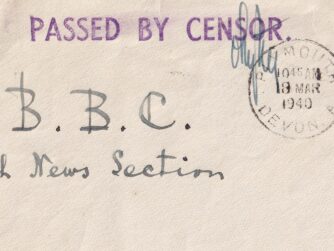Defection and Assassination Plot
Alexander Barmine (1899-1987), a longtime chief of the Russian Service, was one of the most remarkable figures in the history of the Voice of America. He was a former Soviet general and diplomat who had escaped the Stalinist purges by defecting from his post as chargé d’affaires in the Soviet Embassy in Athens in 1937 and lived in exile under a Soviet death sentence. An alleged plot by Soviet agents to assassinate Barmine while he lived in France was foiled by the French authorities. On December 28, 1939, the New York Times published an Associated Press report, dated a day earlier, that Barmine had received permission to come to the United States as an immigrant. The report said that he had quit the diplomatic service at the Soviet Legation in Athens on December 4, 1937, “in protest against Moscow’s ‘purges’ of alleged enemies of the State.” The AP report in the New York Times also said that he had been a member of the Communist Party for 19 years and, since his defection, had written anti-Soviet Russian books. The report quoted him denouncing the Soviet government as a “reactionary dictatorship” and declaring, “I have signed a death warrant and exposed myself to the attacks of paid killers.”1
A 1942 memorandum in the CIA files on the security background investigation of Alexander Barmine, which was declassified in 2008, stated that he had obtained permission to enter the U.S. through the aid of American journalist Walter Lippmann and American Ambassador to France William Bullitt. According to the memorandum, all references gave Barmine a “high recommendation,” and his security clearance for work with the U.S. intelligence was approved. It also stated that, according to informants, he “feels very strongly against the Soviet Government but not against the Russian people” and that “His latest book has not been published as there is question about it being too strong in sentiment against the Russian Government for the present time.” The memorandum concluded that Barmine “is definitely anti-Axis and anxious to aid America.”2
There was no doubt as to Barmine’s willingness to expose Stalin’s purges and other criminal acts of the Soviet regime. The New York Times reported shortly after he arrived in the United States in January 1940 that he had told journalists in New York that Stalin’s purges of the Soviet High Command and the liquidation of thousands of trained officers since 1947 were responsible for the Russian defeats in the Soviet invasion of Finland. Barmine said that Stalin had ordered killing of at least 30,000 Soviet officers. He said, “Stalin is more interested in maintaining himself in power than in protecting the interests of Russia.” He also described Stalin’s military purges as a prelude to his allying with Hitler in August 1939.3
After emigrating from France to the United States, Barmine joined the U.S. Army, became a U.S. citizen in 1943, and worked in the Office of Strategic Services (OSS), the Central Intelligence Agency (CIA) precursor. He wrote and published One Who Survived, a book about his life in Russia and the repressive nature of the Soviet regime. Orville Prescott, a prominent literary critic who reviewed the book for the New York Times in 1945, noted that Barmine became a Communist because, in his youth, he had no opportunity to study the Western traditions of human rights and make responsible judgments. Stalin’s purges and postings abroad as a diplomat opened his eyes, according to the reviewer. Still, the New York Times review also shows that while Barmine was no longer a Communist or even a believer in pure socialism, he had a liberal vision of the role of government in a democracy based on private enterprise and competition. Barmine wrote that private enterprise should be “held within reasonable bounds by a progressive social administration, but neither owned as in Russia nor strangled, as in Germany, by the state.”
Orville Prescott described Barmine as “A man of terrific energy, unusual ability and versatility and of excellent intentions.” In a veiled comment on the strength of the pro-Stalin lobby among the radical Left in the United States at that time, he wrote that publishing Barmine’s book was “probably courageous”. He predicted that it “will be furiously denounced.” On the decision to publish his book, the reviewer added: “Whether it was wise, who can tell?”.4
Before joining the Voice of America, Barmine also contributed articles to newspapers and magazines in Europe, Canada, and the United States and worked for NBC as a linguist and as an advisor for Reader’s Digest.
NOTES:
- Associated Press report in the New York Times, “Barmine Coming to U.S.: Former Soviet Diplomat Gets Permit As An Immigrant,” December 28, 1939, p. 5, https://timesmachine.nytimes.com/timesmachine/1939/12/28/113086894.html?pageNumber=5.
- Memorandum to Major Jean B. Grombach. Subject: Alexander Barmine. By Capt. George E. Brown, Security Officer. May 8, 1942. Approved for release December 9, 2008. CIA, Freedom of Information Electronic Reading Room, https://www.cia.gov/readingroom/docs/DOC_0005293233.pdf.
- The New York Times, “Soviet Defeats Laid by Barmine to Purge: Former Diplomat Says Stalin Had 30,000 Officers Killed,” January 19, 1940, p. 9, https://timesmachine.nytimes.com/timesmachine/1940/01/19/93973960.html?pageNumber=9.
- Orville Prescott, “Books of the Times,” The New York Times, July 13, 1945, p. 7, https://timesmachine.nytimes.com/timesmachine/1945/07/13/94856269.html?pageNumber=7.








